In Focus This Week
Report: Building Trust and Capacity to Protect U.S. Elections
Key Insights from the 2025 Election Integrity Conferences
By R. Michael Alvarez and Betsy Sinclair
In 2025, the Caltech Election Integrity Project convened two landmark international conferences that we co-organized with our teams from the Linde Center for Science, Society, and Policy (LCSSP) at Caltech and the Political Science Department at Washington University in St. Louis (WashU)—one virtual and one in-person—bringing together election officials, technologists, researchers, journalists, nonprofit leaders, and other stakeholders to address the rapidly evolving challenges facing U.S. elections. These events were designed to foster sustained, cross-sector dialogue on protecting democratic processes amid rising threats from misinformation, disinformation, and the rapid adoption of artificial intelligence (AI).
These conferences—Information & Misinformation in Elections (Jan. 16-17, 2025) and Protecting the Election: AI & Governance (Oct. 16-17, 2025)—responded to a fragmented and contested information environment, where false claims about election processes spread quickly and election administrators operated under intense scrutiny and resource constraints. The goal was not only to share technical solutions or academic findings, but to build trust, surface practical insights, and strengthen networks that extend beyond individual election cycles.

Both conferences were intentionally structured to maximize accessibility, relevance, and cross‑sector engagement. Sessions were relatively short and focused, with an emphasis on panels, paper presentations, and moderated discussions rather than long lectures. This design encouraged interaction and made it easier for practitioners to engage alongside researchers.
We were amazed by the interest in our conferences—in our opinion, indicating the importance of and interest in the topics covered. For both conferences, we solicited proposals from the research, election official, and stakeholder communities. We received many more proposals for presentations, discussions, and presentations than we could accomodate, leading us to change the planned format of both conferences to maximize participation. The attendance at both conferences was remarkable! Almost 300 registrants participated in at least part of the January 2025 virtual conference, with 725 views to date of the post-event session videos on our January YouTube playlist. The October 2025 conference welcomed 85 in-person participants to the Knight Center at WashU with 450 views to date of the post-event session videos on our October YouTube playlist.
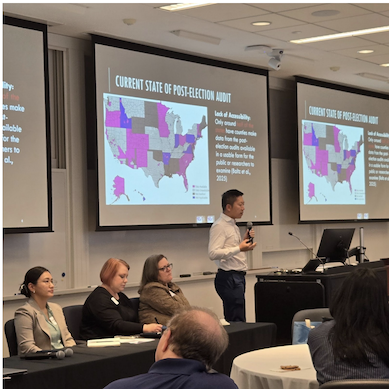 Through sustained dialogue and collaborative sessions, several critical themes and actionable lessons emerged, illustrated by real-world examples and research. These concepts are mentioned below and in our recorded conversation from the January 14, 2026 Inside the 2025 Caltech Election Integrity Project Conferences: Research, Risks, and Real-World Implications episode of Election Science Office Hours:
Through sustained dialogue and collaborative sessions, several critical themes and actionable lessons emerged, illustrated by real-world examples and research. These concepts are mentioned below and in our recorded conversation from the January 14, 2026 Inside the 2025 Caltech Election Integrity Project Conferences: Research, Risks, and Real-World Implications episode of Election Science Office Hours:
- Trust as Democratic Infrastructure: Trust emerged as the foundational element for effective election administration. The conferences highlighted that trust must be deliberately cultivated—between election officials and voters, between researchers and practitioners, and across institutions and other stakeholder groups. Real-world examples, such as transparent communication during crises and collaborative public information campaigns, demonstrated how trust can be built and maintained, even in the face of persistent misinformation.
- The Dual Nature of Artificial Intelligence: AI offers significant promise for improving election administration, from automating routine tasks to enhancing voter engagement. However, the conferences underscored that governance frameworks and practical guidance for AI adoption lag behind technological developments. Panelists stressed the necessity of human oversight, transparent sourcing, and clear boundaries for AI use, especially in critical systems like vote tabulation. AI should augment, not replace, human judgment and accountability.
- Persistent and Adaptive Information Threats: Misinformation and disinformation remain adaptive and persistent threats to election integrity. The conferences showcased both the operational burdens these threats place on election offices and innovative strategies to counter them, such as prebunking (inoculating the public against falsehoods before they spread) and rapid, transparent communication. Research presented at the conferences demonstrated that while interventions can temporarily boost public confidence, sustained and repeated efforts are necessary to maintain trust in a saturated media environment.
- Federal Uncertainty and Institutional Capacity: A recurring concern was the uncertainty surrounding federal support for election security and administration. The dismantling of key agencies and high turnover among election officials threaten the resilience of the election system. The conferences called for stable, long-term federal investment in cybersecurity, training, contingency planning, and audit standardization, with special attention to disparities between urban and rural jurisdictions.
These conferences demonstrated that safeguarding U.S. elections is not solely a technological challenge, but a human and institutional one. Building trust, fostering collaboration, and ensuring the translation of research into practice are essential to democratic resilience. Continued investment in these relationships and structures will be critical as the nation faces future election cycles and the evolving landscape of information threats. Drawing on the lessons and discussions from both conferences, the following recommendations are advanced to strengthen U.S. election integrity:
- Institutionalize Cross-Sector Convenings: Make regular, structured gatherings of election stakeholders a core policy tool to foster collaboration, share best practices, and coordinate responses to emerging threats.
- Develop Practical AI Governance Guidance: Create clear, actionable frameworks and resources to guide responsible AI adoption in election administration, emphasizing human oversight and transparency.
- Expand Access to Nonpartisan, Research-Based Resources: Support the development and dissemination of empirical research, communication toolkits, and educational materials tailored for diverse communities and jurisdictions.
- Support Long-Term Researcher–Practitioner Partnerships: Invest in sustained collaborations that translate research into operational solutions, ensuring innovations are grounded in real-world needs.
- Maintain Stable Federal Support: Prioritize consistent federal funding, leadership, and interagency coordination to provide election officials with the resources and guidance needed to adapt to technological and operational challenges.
We invite you to read our comprehensive report on these significant events, now available here on the Caltech Election Integrity Project website. The report contains agendas, detailed summaries of all sessions that took place at both conferences, links to individual presentation videos, slide decks, and even a few pictures!
Please reach out to us directly if you have any questions, or send an email to lcssp@caltech.edu.
Michael Alvarez is the Flintridge Foundation Professor of Political and Computational Social Science at Caltech, Co-Director, Linde Center for Science, Society, and Policy (LCSSP) at Caltech, and Co-Director, Caltech/MIT Voting Technology Project.
Betsy Sinclair is the Thomas F. Eagleton University Professor of Public Affairs and Political Science at Washington University in St. Louis (WashU), Assistant Vice Provost of Digital Transformations at WashU and Chair of the WashU Department of Political Science.
electionline Daily News Email
 What’s the best part of waking up? electionline Daily News in your inbox of course so be sure to sign up for your daily dose.
What’s the best part of waking up? electionline Daily News in your inbox of course so be sure to sign up for your daily dose.
Each morning you’ll receive the top headlines of the day, plus a listing of states featured in that day’s news round up.
To sign up, simply visit our site and provide us with your email and you’ll begin receiving the news in your inbox each morning.
We Google so you don’t have to!
electionline Merch
 You’ve asked for it, well now you’ve got it! Just in time for all of your holiday gift-giving. We’ve opened up an electionline merch store using Bonfire. Currently we’re offering a couple of different t-shirts, a long-sleeve t-shirt and a hoodie.
You’ve asked for it, well now you’ve got it! Just in time for all of your holiday gift-giving. We’ve opened up an electionline merch store using Bonfire. Currently we’re offering a couple of different t-shirts, a long-sleeve t-shirt and a hoodie.
Election News This Week
 Federal Update: Votebeat has a look at how state and local elections officials are dealing with the changes to the Cybersecurity and Infrastructure Security Agency and how they will impact election security. “They [CISA under previous Administrations] focused on what they could do well and how they could make systems more resilient,” said Gabriel Sterling, the former chief operating officer of Georgia’s secretary of state office and now a Republican candidate for the job. “Now, I have no idea what the goal is. I don’t think anyone really understands the mission. I don’t think they even understand the mission.” According to multiple published reports, the Trump administration has acknowledged for the first time in a court filing that members of the U.S. DOGE Service accessed and shared sensitive Social Security data without the awareness of agency officials. The Justice Department submitted a court filing January 16 in an ongoing case saying that the Social Security Administration had discovered a secret agreement between a DOGE employee and an unidentified political advocacy group. The agreement called for sharing Social Security data with the aim of overturning election results in certain states, according to the filing. Social Security said it was not previously aware of the agreement and that it has made referrals for potential Hatch Act violations to the Office of Special Counsel, which investigates violations of the law barring political activity in the civilian workforce. The agency learned of the agreement in November, according to the court filing, but had “not yet seen evidence that SSA data were shared with the advocacy group.” Speaking at the World Economic Forum in Davos, Switzerland, President Donald J. Trump said “everybody now knows that” the 2020 presidential election was rigged and “people will soon be prosecuted for what they did.” The president did not elaborate on who will be prosecuted or with what crimes they would be charged with, and The Department of Justice did not immediately respond to a request for comment.
Federal Update: Votebeat has a look at how state and local elections officials are dealing with the changes to the Cybersecurity and Infrastructure Security Agency and how they will impact election security. “They [CISA under previous Administrations] focused on what they could do well and how they could make systems more resilient,” said Gabriel Sterling, the former chief operating officer of Georgia’s secretary of state office and now a Republican candidate for the job. “Now, I have no idea what the goal is. I don’t think anyone really understands the mission. I don’t think they even understand the mission.” According to multiple published reports, the Trump administration has acknowledged for the first time in a court filing that members of the U.S. DOGE Service accessed and shared sensitive Social Security data without the awareness of agency officials. The Justice Department submitted a court filing January 16 in an ongoing case saying that the Social Security Administration had discovered a secret agreement between a DOGE employee and an unidentified political advocacy group. The agreement called for sharing Social Security data with the aim of overturning election results in certain states, according to the filing. Social Security said it was not previously aware of the agreement and that it has made referrals for potential Hatch Act violations to the Office of Special Counsel, which investigates violations of the law barring political activity in the civilian workforce. The agency learned of the agreement in November, according to the court filing, but had “not yet seen evidence that SSA data were shared with the advocacy group.” Speaking at the World Economic Forum in Davos, Switzerland, President Donald J. Trump said “everybody now knows that” the 2020 presidential election was rigged and “people will soon be prosecuted for what they did.” The president did not elaborate on who will be prosecuted or with what crimes they would be charged with, and The Department of Justice did not immediately respond to a request for comment.
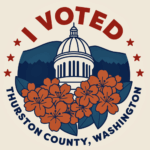 AI-Enabled Election Security: The Thurston County, Washington Auditor’s Office plans to use AI-enabled security cameras at its Voter Registration Center in Tumwater. In a 3-2 vote Tuesday, the Board of County Commissioners approved a $35,104 grant agreement for the Auditor’s Office to procure and install AI-enabled software on existing security cameras. The software is intended to flag potential threats, including weapons and bombs, for elections staff, according to a copy of the agreement and comments made by Auditor Mary Hall last week. The grant money originates from a U.S. Department of Justice program but will be passed through the Washington State Department of Commerce. The AI-enabled software will be installed on two interior cameras, pointed at the public entrance, and 16 other exterior cameras, Auditor’s Office spokesperson Emmett O’Connell confirmed with The Olympian. O’Connell said the Auditor’s Office does not yet have a timeline for installing the AI-enabled software on the cameras. “This technology is designed to identify potential threats of violence to staff and the public,” Commissioner Carolina Mejia said. “It’s not facial recognition. It is not used to identify voters, and it’s not used to monitor lawful political activity.” “All systems remain under local control,” Mejia said. “Data is not shared unless required by law, and the county is bound by state and federal privacy civil rights and public records.”
AI-Enabled Election Security: The Thurston County, Washington Auditor’s Office plans to use AI-enabled security cameras at its Voter Registration Center in Tumwater. In a 3-2 vote Tuesday, the Board of County Commissioners approved a $35,104 grant agreement for the Auditor’s Office to procure and install AI-enabled software on existing security cameras. The software is intended to flag potential threats, including weapons and bombs, for elections staff, according to a copy of the agreement and comments made by Auditor Mary Hall last week. The grant money originates from a U.S. Department of Justice program but will be passed through the Washington State Department of Commerce. The AI-enabled software will be installed on two interior cameras, pointed at the public entrance, and 16 other exterior cameras, Auditor’s Office spokesperson Emmett O’Connell confirmed with The Olympian. O’Connell said the Auditor’s Office does not yet have a timeline for installing the AI-enabled software on the cameras. “This technology is designed to identify potential threats of violence to staff and the public,” Commissioner Carolina Mejia said. “It’s not facial recognition. It is not used to identify voters, and it’s not used to monitor lawful political activity.” “All systems remain under local control,” Mejia said. “Data is not shared unless required by law, and the county is bound by state and federal privacy civil rights and public records.”
 Election Center News: Election Center is thrilled to announce that Tommy Gong and Tonya Wichman, both CERA certified, have joined its Board of Directors. Tommy Gong is the County Clerk for Lane County, Oregon. Completing his 22nd year in election administration, Tommy previously served in California counties, including Contra Costa, San Luis Obispo, and Stanislaus. Tommy is an advisory board member for the Election Official Legal Defense Network, a member of the Bipartisan Policy Center’s Task Force on Elections, a member of the Election Workforce Advisory Council, a member of Issue One’s Faces of Democracy campaign, and a Board of Director for the California
Election Center News: Election Center is thrilled to announce that Tommy Gong and Tonya Wichman, both CERA certified, have joined its Board of Directors. Tommy Gong is the County Clerk for Lane County, Oregon. Completing his 22nd year in election administration, Tommy previously served in California counties, including Contra Costa, San Luis Obispo, and Stanislaus. Tommy is an advisory board member for the Election Official Legal Defense Network, a member of the Bipartisan Policy Center’s Task Force on Elections, a member of the Election Workforce Advisory Council, a member of Issue One’s Faces of Democracy campaign, and a Board of Director for the California  Voter Foundation. Gong also led the award-winning effort to form the Coalition of Bay Area Election Officials, bringing together neighboring counties to collaborate on building public trust in elections in shared media markets. Tonya Wichman is the Director of Defiance County Board of Elections. She is an election administration leader with more than a decade of experience strengthening, modernizing, and securing elections in Defiance County. Wichman has led major initiatives, including the implementation of new voting equipment, the transition to electronic poll books, and significant expansions in cyber and physical security. She is certified as an Ohio Registered Elections Official and a Certified Election Registration Administrator (CERA), and serves on state and national committees, mentors other counties, and contributes to innovation through the ASU AI and Democracy Lab and the Election Center board, and co-founded the Election Ambassadors Scholarship Program to support and inspire future leaders in Defiance County. Los Angeles County Registrar-Recorder/County Clerk Dean Logan has stepped down from the Election Center board.
Voter Foundation. Gong also led the award-winning effort to form the Coalition of Bay Area Election Officials, bringing together neighboring counties to collaborate on building public trust in elections in shared media markets. Tonya Wichman is the Director of Defiance County Board of Elections. She is an election administration leader with more than a decade of experience strengthening, modernizing, and securing elections in Defiance County. Wichman has led major initiatives, including the implementation of new voting equipment, the transition to electronic poll books, and significant expansions in cyber and physical security. She is certified as an Ohio Registered Elections Official and a Certified Election Registration Administrator (CERA), and serves on state and national committees, mentors other counties, and contributes to innovation through the ASU AI and Democracy Lab and the Election Center board, and co-founded the Election Ambassadors Scholarship Program to support and inspire future leaders in Defiance County. Los Angeles County Registrar-Recorder/County Clerk Dean Logan has stepped down from the Election Center board.
 Podcast News: In the latest episode of High Turnout Wide Margins, hosts Eric Fey and Brianna Lennon speak with Michelle Kavanaugh, the Bernalillo County Clerk in New Mexico. They spoke about some of the recent changes to New Mexican election law, which include automatic voter registration at the Motor Vehicle Division, semi-open primaries and the restoration of voting rights to citizens after incarceration — regardless of felony status. On the latest episode of Election Science Office Hours host R. Michael Alvarez talks with Betsy Sinclair about the work that they did in 2025 on AI and elections. In 2025 they organized and hosted two major conferences, bringing together researchers, election officials, election technologists, and stakeholders. The first conference focused on information and elections, and then the second on how new AI technologies might be used to improve election administration. Throughout they also talked about the risks of new AI technologies for election administration.
Podcast News: In the latest episode of High Turnout Wide Margins, hosts Eric Fey and Brianna Lennon speak with Michelle Kavanaugh, the Bernalillo County Clerk in New Mexico. They spoke about some of the recent changes to New Mexican election law, which include automatic voter registration at the Motor Vehicle Division, semi-open primaries and the restoration of voting rights to citizens after incarceration — regardless of felony status. On the latest episode of Election Science Office Hours host R. Michael Alvarez talks with Betsy Sinclair about the work that they did in 2025 on AI and elections. In 2025 they organized and hosted two major conferences, bringing together researchers, election officials, election technologists, and stakeholders. The first conference focused on information and elections, and then the second on how new AI technologies might be used to improve election administration. Throughout they also talked about the risks of new AI technologies for election administration.
 Sticker News: Congratulations to fifth graders Avery Austian and Millie Diffendaffer for winning the inaugural “I Voted” sticker contest in Cleveland County, Oklahoma. Cleveland County Election Board Secretary Bryant Rains debuted the inaugural countywide “I Voted” sticker design contest last fall, which quickly received an influx of submissions drawn in marker, colored pencil and crayon. Rains said the election board sorted through the “overwhelming” number of over 780 entries to narrow it down to just 10 sticker designs, then let the voters decide who would win. When the sticker election results came back, two sticker designers were both declared winners — their results only differed by one vote. Their designs will be featured alongside the classic flag design at the Feb. 10 and April 7 Board of Education and municipal elections in Cleveland County. Rains said that when the election board started the contest he wasn’t sure how county youth would respond. “We loved the idea of getting students in Cleveland County involved in the electoral process, but we weren’t sure how it was going to be received. But we’ve been blown away by the response,” Rains said.
Sticker News: Congratulations to fifth graders Avery Austian and Millie Diffendaffer for winning the inaugural “I Voted” sticker contest in Cleveland County, Oklahoma. Cleveland County Election Board Secretary Bryant Rains debuted the inaugural countywide “I Voted” sticker design contest last fall, which quickly received an influx of submissions drawn in marker, colored pencil and crayon. Rains said the election board sorted through the “overwhelming” number of over 780 entries to narrow it down to just 10 sticker designs, then let the voters decide who would win. When the sticker election results came back, two sticker designers were both declared winners — their results only differed by one vote. Their designs will be featured alongside the classic flag design at the Feb. 10 and April 7 Board of Education and municipal elections in Cleveland County. Rains said that when the election board started the contest he wasn’t sure how county youth would respond. “We loved the idea of getting students in Cleveland County involved in the electoral process, but we weren’t sure how it was going to be received. But we’ve been blown away by the response,” Rains said.
Personnel News: San Mateo County California’s long-serving Assessor-County Clerk-Recorder and Chief Elections Officer Mark Church announced that he will not seek re-election to a fifth term. DeNay Harris is the new New Hanover County, North Carolina board of elections director. Armando Salud-Ambriz today officially announced his campaign for Nevada County, California Clerk-Recorder/Registrar of Voters. Retiring McDowell County, North Carolina Elections Director Kimberly Wellborn was recently recognized for 30 years of service. Lucas County Director of Elections LaVera Scott is the new president of the Ohio Association of Election Officials. Dennis Shedd has stepped down as the chairman of the South Carolina Election Commission. Robert Bolchoz has been appointed chairman of the South Carolina Election Commission. Brittany Duke has been named the new Hickman County, Tennessee elections administrator.
Ballot Measures, Legislation & Rulemaking
 Federal Legislation: Congressional appropriators announced funding legislation this week that extends an expiring cyber threat information-sharing law and provides $2.6 billion for the Cybersecurity and Infrastructure Security Agency (CISA), including money for election security and directives on staffing levels. Under the bill, $39.6 million would go to continuing election security programs, namely election security advisers in each CISA region across the country and the continuation of the Elections Infrastructure Information Sharing and Analysis Center (EI-ISAC). Last spring, the organization that supports the EI-ISAC said it no longer was doing so after the Trump administration terminated funding, with DHS saying the EI-ISAC no longer aligns with its mission.
Federal Legislation: Congressional appropriators announced funding legislation this week that extends an expiring cyber threat information-sharing law and provides $2.6 billion for the Cybersecurity and Infrastructure Security Agency (CISA), including money for election security and directives on staffing levels. Under the bill, $39.6 million would go to continuing election security programs, namely election security advisers in each CISA region across the country and the continuation of the Elections Infrastructure Information Sharing and Analysis Center (EI-ISAC). Last spring, the organization that supports the EI-ISAC said it no longer was doing so after the Trump administration terminated funding, with DHS saying the EI-ISAC no longer aligns with its mission.
According to the Desert News, Republican leaders are ramping up efforts to ban noncitizens from voting in federal elections by reviving a bill from Utah Sen. Mike Lee to implement stricter identification requirements. House Majority Leader Steve Scalise (R-Louisiana) hinted at plans to bolster the Safeguard American Voter Eligibility, or SAVE Act, by adding photo ID requirements in order to cast a ballot. The proposal builds on legislation already introduced by Lee in the Senate that would require proof of U.S. citizenship when registering to vote, a key campaign promise President Donald Trump made during the 2024 election cycle. “What we’re looking at doing is passing an even better bill over to the Senate to give them even more incentive to go protect the sanctity of every American’s vote, and that is the SAVE Act Plus,” Scalise told Fox News over the weekend. “You can’t even get on an airplane. You can’t go to a bar tonight without showing a picture ID. Yet there are people in many states where the states actually have laws saying you can’t show ID, which is a recipe for fraud.” Lee told the Deseret News he is already working with other lawmakers to draft a new “and even stronger” version of the bill, although a timeline is not yet clear. The House passed the SAVE Act last year but it has yet to be considered by the Senate, where it would need substantial support from Democrats to overcome filibuster rules.
 Alabama: The House of Representatives passed a bill that would require probate judges to conduct audits after state and county elections. HB 95, sponsored by Joe Lovvorn, R-Auburn, passed on a 72-25 mostly-partly line vote, would require an audit of one contest and one contest, selected at random by a local canvassing board. “It does not change election results. It only checks them or the post audit of the machines at random,” Lovvorn said on the House floor. The Legislative Fiscal Office says that an audit would cost $35,000 per day. House Democrats debated the bill for hours, questioning its expense and necessity and saying it could undermine faith in elections. During the 2025 legislative session former Rep. Debbie Wood, R-Valley, filed a similar bill that passed the House but did not come to a vote in the Senate.
Alabama: The House of Representatives passed a bill that would require probate judges to conduct audits after state and county elections. HB 95, sponsored by Joe Lovvorn, R-Auburn, passed on a 72-25 mostly-partly line vote, would require an audit of one contest and one contest, selected at random by a local canvassing board. “It does not change election results. It only checks them or the post audit of the machines at random,” Lovvorn said on the House floor. The Legislative Fiscal Office says that an audit would cost $35,000 per day. House Democrats debated the bill for hours, questioning its expense and necessity and saying it could undermine faith in elections. During the 2025 legislative session former Rep. Debbie Wood, R-Valley, filed a similar bill that passed the House but did not come to a vote in the Senate.
Rep. Jamie Kiel, R-Russellville, has filed a bill that would prohibit the state from selling phone numbers and other personal information from voter rolls for commercial purposes. Current law allows the state to sell all personal information included in voter registration lists, except for Social Security numbers. House Bill 71 would make sure the state is not “complicit” in robocalling and will protect Alabamians’ privacy, he said. The bill has 33 co-sponsors. The bill is expected to get its first vote Wednesday in the House Constitution, Campaigns and Elections Committee. It specifies that the secretary of state also would be forbidden from releasing emails, months and days of birth and voter ID and driver license numbers. Authorized government agencies at the local, federal and state level would still be able to access this confidential information.
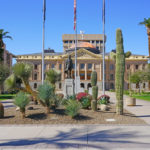 Arizona: Secretary of State Adrian Fontes announced new legislation that would seek to improve voting access and provide funding to improve the cybersecurity of state and county election systems. During a press conference, Fontes called the legislation, called the Voters First Act, a “research-based, common-sense proposal to modernize, standardize and prioritize the voting process across all 15 counties in Arizona.” The act, which was introduced by Democratic party leaders in both houses this week, includes statewide restoration of Arizona’s permanent early vote list, which allows voters to receive ballots by mail for early voting, and applies the state’s 75-foot “voter protection zone” to ballot drop boxes and voting locations. It would extend the early voting period, allow the state to accept private grant funding to educate the public about the basic facts of statewide elections and allow ballots to be collected and processed continually on election day, for faster results. The act would provide $1 million from state general funds to the secretary of state’s office, at least half of which would be used to purchase equipment for voting centers. Funds would also be provided for mandatory participation in a “multistate electronic voter registration information center.” Though the bill does not name a particular organization. The remainder of that funding would be used to improve the state’s ballot tracking system and provide members of the public with text notifications when their ballots have been counted. An additional $1 million from the state general fund would pay for improvements to state and county technology and cybersecurity programs.
Arizona: Secretary of State Adrian Fontes announced new legislation that would seek to improve voting access and provide funding to improve the cybersecurity of state and county election systems. During a press conference, Fontes called the legislation, called the Voters First Act, a “research-based, common-sense proposal to modernize, standardize and prioritize the voting process across all 15 counties in Arizona.” The act, which was introduced by Democratic party leaders in both houses this week, includes statewide restoration of Arizona’s permanent early vote list, which allows voters to receive ballots by mail for early voting, and applies the state’s 75-foot “voter protection zone” to ballot drop boxes and voting locations. It would extend the early voting period, allow the state to accept private grant funding to educate the public about the basic facts of statewide elections and allow ballots to be collected and processed continually on election day, for faster results. The act would provide $1 million from state general funds to the secretary of state’s office, at least half of which would be used to purchase equipment for voting centers. Funds would also be provided for mandatory participation in a “multistate electronic voter registration information center.” Though the bill does not name a particular organization. The remainder of that funding would be used to improve the state’s ballot tracking system and provide members of the public with text notifications when their ballots have been counted. An additional $1 million from the state general fund would pay for improvements to state and county technology and cybersecurity programs.
 Arkansas: Arkansas lawmakers are preparing to implement new rules that more clearly define what authorized poll watchers can — and cannot — do inside polling places. Chris Madison, director of the Arkansas State Board of Election Commissioners, said the changes are designed to reduce confusion and prevent conflicts that surfaced during the last election cycle. The updated rules were approved by the Arkansas Legislative Council’s Administrative Rules Subcommittee and are headed to the full Arkansas Legislative Council for final consideration. At the center of the revisions is where poll watchers may stand and what they are permitted to observe. Under the previous standard, poll watchers could position themselves close enough to hear voters’ names as they checked in. The new language adds that poll watchers will be allowed to stand close enough to watch how the polling site functions and may move around the location to observe procedures as they occur. The rules also draw a sharper line around voter privacy. Poll watchers may not be within six feet of a voter while that voter is casting a ballot. They also may not place themselves in any position where they can see how someone votes. In addition to physical boundaries, the updated rules spell out the role of a poll watcher. The guidance emphasizes that poll watchers are present to observe — not to “police” poll workers. Instead, the rules outline how concerns should be raised and who should be contacted if a watcher believes an issue is not being addressed appropriately.
Arkansas: Arkansas lawmakers are preparing to implement new rules that more clearly define what authorized poll watchers can — and cannot — do inside polling places. Chris Madison, director of the Arkansas State Board of Election Commissioners, said the changes are designed to reduce confusion and prevent conflicts that surfaced during the last election cycle. The updated rules were approved by the Arkansas Legislative Council’s Administrative Rules Subcommittee and are headed to the full Arkansas Legislative Council for final consideration. At the center of the revisions is where poll watchers may stand and what they are permitted to observe. Under the previous standard, poll watchers could position themselves close enough to hear voters’ names as they checked in. The new language adds that poll watchers will be allowed to stand close enough to watch how the polling site functions and may move around the location to observe procedures as they occur. The rules also draw a sharper line around voter privacy. Poll watchers may not be within six feet of a voter while that voter is casting a ballot. They also may not place themselves in any position where they can see how someone votes. In addition to physical boundaries, the updated rules spell out the role of a poll watcher. The guidance emphasizes that poll watchers are present to observe — not to “police” poll workers. Instead, the rules outline how concerns should be raised and who should be contacted if a watcher believes an issue is not being addressed appropriately.
 Indiana: A bill banning ranked choice voting in Indiana, which the state doesn’t utilize as a voting method, passed out of the Senate this week. Senate Bill 12, authored by State Sen. Blake Doriot, R-Goshen, states that an election may not be decided by ranked choice voting. During the third reading discussion of the bill, Doriot said that Indiana doesn’t use ranked choice voting. The process is confusing, especially for the elderly, first-time voters and people with a language barrier, Doriot said. State Sen. Andrea Hunley, D-Indianapolis, offered an amendment to the bill when it was heard on second reading last week that would’ve formed a committee to study the impacts of ranked choice voting in Indiana. The bill passed 38-9 Tuesday. It will move on for consideration by the House.
Indiana: A bill banning ranked choice voting in Indiana, which the state doesn’t utilize as a voting method, passed out of the Senate this week. Senate Bill 12, authored by State Sen. Blake Doriot, R-Goshen, states that an election may not be decided by ranked choice voting. During the third reading discussion of the bill, Doriot said that Indiana doesn’t use ranked choice voting. The process is confusing, especially for the elderly, first-time voters and people with a language barrier, Doriot said. State Sen. Andrea Hunley, D-Indianapolis, offered an amendment to the bill when it was heard on second reading last week that would’ve formed a committee to study the impacts of ranked choice voting in Indiana. The bill passed 38-9 Tuesday. It will move on for consideration by the House.
 Kansas: An aide to the secretary of state warned lawmakers this week that moving all local elections to even-numbered years, so that candidates for city, county and school board seats appear on the same ballot as candidates for president or governor, would have consequences for voters and election officials. The proposal is among numerous changes to election law sought by Rep. Pat Proctor, a Leavenworth Republican who chairs the House Elections Committee and is running for the GOP nomination for secretary of state, which administers elections. Proctor said moving elections to even-numbered years would improve voter turnout, which a voting rights advocate pointed out was at odds with Proctor’s record of making it more difficult to participate in elections. Clay Barker, general counsel for the Secretary of State’s office, said during a hearing before Proctor’s committee that combining elections would “exponentially increase” the number of ballot versions printed, to account for the boundary lines of small offices, such as school board seats and drainage districts. He also said the ballots would be much longer, costing more to print and leading to longer lines at the polls as voters take more time to fill them out. If passed, the law would take effect in 2028.
Kansas: An aide to the secretary of state warned lawmakers this week that moving all local elections to even-numbered years, so that candidates for city, county and school board seats appear on the same ballot as candidates for president or governor, would have consequences for voters and election officials. The proposal is among numerous changes to election law sought by Rep. Pat Proctor, a Leavenworth Republican who chairs the House Elections Committee and is running for the GOP nomination for secretary of state, which administers elections. Proctor said moving elections to even-numbered years would improve voter turnout, which a voting rights advocate pointed out was at odds with Proctor’s record of making it more difficult to participate in elections. Clay Barker, general counsel for the Secretary of State’s office, said during a hearing before Proctor’s committee that combining elections would “exponentially increase” the number of ballot versions printed, to account for the boundary lines of small offices, such as school board seats and drainage districts. He also said the ballots would be much longer, costing more to print and leading to longer lines at the polls as voters take more time to fill them out. If passed, the law would take effect in 2028.
 Mississippi: As the U.S. Supreme Court weighs a case that could further weaken the federal Voting Rights Act, some Mississippi lawmakers are moving to write their own version. State lawmakers in the Legislative Black Caucus on Martin Luther King Jr. Day filed legislation to create a state-level version of the Voting Rights Act. They said their act is designed to safeguard minority voting rights, as the nation’s highest court has indicated it’s open to revisit provisions of the Civil Rights era federal law and has already overturned some. The state legislation would prohibit dilution of minority voters, create a Mississippi Voting Rights Commission and require some jurisdictions to obtain preclearance approval from the newly created commission. The bill would be named the Robert G. Clark Jr. Voting Rights Act, in honor of Clark, who in 1967 became the first Black Mississippian elected to the state Legislature in the modern era. Clark was ostracized when first elected to the House and sat at a desk by himself without the traditional deskmates that other House members had. But he became a respected legislative leader.
Mississippi: As the U.S. Supreme Court weighs a case that could further weaken the federal Voting Rights Act, some Mississippi lawmakers are moving to write their own version. State lawmakers in the Legislative Black Caucus on Martin Luther King Jr. Day filed legislation to create a state-level version of the Voting Rights Act. They said their act is designed to safeguard minority voting rights, as the nation’s highest court has indicated it’s open to revisit provisions of the Civil Rights era federal law and has already overturned some. The state legislation would prohibit dilution of minority voters, create a Mississippi Voting Rights Commission and require some jurisdictions to obtain preclearance approval from the newly created commission. The bill would be named the Robert G. Clark Jr. Voting Rights Act, in honor of Clark, who in 1967 became the first Black Mississippian elected to the state Legislature in the modern era. Clark was ostracized when first elected to the House and sat at a desk by himself without the traditional deskmates that other House members had. But he became a respected legislative leader.
 Missouri: A wide-ranging elections bill would restore Missouri’s presidential primary and lengthen the time that voters can cast an absentee ballot in-person without and excuse. It’s sponsored by State Rep. Peggy McGaugh, R-Carroll County. McGaugh, a former county clerk, described the decision to replace the primary with party caucuses a few years ago as a mistake. McGaugh’s bill would also expand Missouri’s no-excuse absentee voting period from two to four weeks. She said feedback from county clerks in larger counties suggested strong support for expanding the no-excuse voting period. Other provision in the bill include: Requires that automatic tabulating equipment be tested no later than a week before an election; Requires that lists of absentee ballot applications from people with permanent disabilities be kept confidential and not be publicly displayed; Allows provisional ballots to be cast in any public election; and Bans electioneering, exit polling, surveying, and sampling within 50 feet of a polling place on Election Day (current law bans them within 25 feet).
Missouri: A wide-ranging elections bill would restore Missouri’s presidential primary and lengthen the time that voters can cast an absentee ballot in-person without and excuse. It’s sponsored by State Rep. Peggy McGaugh, R-Carroll County. McGaugh, a former county clerk, described the decision to replace the primary with party caucuses a few years ago as a mistake. McGaugh’s bill would also expand Missouri’s no-excuse absentee voting period from two to four weeks. She said feedback from county clerks in larger counties suggested strong support for expanding the no-excuse voting period. Other provision in the bill include: Requires that automatic tabulating equipment be tested no later than a week before an election; Requires that lists of absentee ballot applications from people with permanent disabilities be kept confidential and not be publicly displayed; Allows provisional ballots to be cast in any public election; and Bans electioneering, exit polling, surveying, and sampling within 50 feet of a polling place on Election Day (current law bans them within 25 feet).
 Ohio: Ohio Democratic lawmakers have proposed legislation to make Election Day a state holiday. The state’s voter turnout varies per election, ranging from 70% for the 2024 presidential election to 10% in 2025. State Sen. Kent Smith, D-Euclid, proposed a solution. “If elected officials in Ohio really respect voters, we should respect them enough to allow them to get to the ballot on election day,” Smith said in an interview. He introduced, alongside several Democratic colleagues, Ohio Senate Bill 335, which would make a general election a public holiday. The first Tuesday after the first Monday in November would be “Democracy Day.” “Holidays are considered special days, and that’s one of the things that I think we need to always be doing — trying to educate the young people in Ohio about the importance of voting,” the lawmaker said. The bill will be heard in the coming months, and Smith is confident that, despite the legislature having a GOP supermajority, his idea is bipartisan and can succeed.
Ohio: Ohio Democratic lawmakers have proposed legislation to make Election Day a state holiday. The state’s voter turnout varies per election, ranging from 70% for the 2024 presidential election to 10% in 2025. State Sen. Kent Smith, D-Euclid, proposed a solution. “If elected officials in Ohio really respect voters, we should respect them enough to allow them to get to the ballot on election day,” Smith said in an interview. He introduced, alongside several Democratic colleagues, Ohio Senate Bill 335, which would make a general election a public holiday. The first Tuesday after the first Monday in November would be “Democracy Day.” “Holidays are considered special days, and that’s one of the things that I think we need to always be doing — trying to educate the young people in Ohio about the importance of voting,” the lawmaker said. The bill will be heard in the coming months, and Smith is confident that, despite the legislature having a GOP supermajority, his idea is bipartisan and can succeed.
 Oklahoma: Just like last year, multiple bills aim to make changes to the in-person absentee voting process. Two bills filed this session hope to reduce the chaos of early voting. OKC-based Senate Minority Leader Julia Kirt’s Senate Bill 1362 would add Saturday from 8 a.m. to 6 p.m. as an early voting day for all elections run by county election boards. Fellow Senate Democrat Mary Boren of Norman filed Senate Bill 1384, which would establish the In-Person Absentee Voting Expansion Grant Program. The initiative would create funds for additional early voting sites during even-year statewide elections every other November. Measures to increase early voting options stalled in committee last session, so it remains to be seen whether these tweaked efforts get more traction.
Oklahoma: Just like last year, multiple bills aim to make changes to the in-person absentee voting process. Two bills filed this session hope to reduce the chaos of early voting. OKC-based Senate Minority Leader Julia Kirt’s Senate Bill 1362 would add Saturday from 8 a.m. to 6 p.m. as an early voting day for all elections run by county election boards. Fellow Senate Democrat Mary Boren of Norman filed Senate Bill 1384, which would establish the In-Person Absentee Voting Expansion Grant Program. The initiative would create funds for additional early voting sites during even-year statewide elections every other November. Measures to increase early voting options stalled in committee last session, so it remains to be seen whether these tweaked efforts get more traction.
With Senate Bill 1351, Republican Micheal Bergstrom of Adair wants to prevent people who have never had a permanent home in the United States from voting in Oklahoma. The measure deals with the legal issue of domicile, which is different from the concept of residency. Domicile refers to establishing a permanent home in a certain nation or state, while residency is about physical presence. Although the two are often intertwined, an individual could hypothetically reside in Oklahoma but not domicile here if they were from another country and planned to move back in the near future, meaning they may still retain bank accounts and tax responsibilities in their home nation. Bergstrom’s proposal would prevent individuals who have never domiciled in the United States from voting in Oklahoma, even if they are U.S. citizens and residents.
House Republican Jim Olsen of Roland tackled the topic of ex-pats in House Bill 2938. If passed, the law would prevent individuals who move out of the state or the country indefinitely from voting in state or local elections as an Oklahoma voter, only allowing them to cast their ballot in national races. Individuals who vote in another state or country would also be barred from voting in Oklahoma’s state or local elections.
Senate Bill 1451 adds additional categories to the data collected during voter registration. Those would include whether an individual has ever been rejected from voting in another state, the address where the individual is registered to vote and a statement acknowledging that registering to vote in Oklahoma will void any registration someone has in another state.
Senate Bill 1583 would create the Oklahoma Voting Rights Act. The law would prevent discrimination against voters of protected classes, such as race or tribal affiliation, and lays out ways to identify voter discrimination.
 South Carolina: Senate Bill 128 would require anyone registering to vote in South Carolina to provide satisfactory evidence of U.S. citizenship. Under the bill, a person could not be added to the voter rolls unless they submit approved documentation to their county voter registration board. The legislation outlines several forms of acceptable proof, including a valid driver’s license, a current U.S. passport, or a legible birth certificate. It also directs the state Attorney General to review existing voter registration rolls once the law takes effect to ensure compliance.
South Carolina: Senate Bill 128 would require anyone registering to vote in South Carolina to provide satisfactory evidence of U.S. citizenship. Under the bill, a person could not be added to the voter rolls unless they submit approved documentation to their county voter registration board. The legislation outlines several forms of acceptable proof, including a valid driver’s license, a current U.S. passport, or a legible birth certificate. It also directs the state Attorney General to review existing voter registration rolls once the law takes effect to ensure compliance.
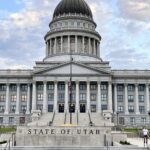 Utah: A new bill proposed would require people who want to vote in state elections to provide proof of U.S. citizenship. The proposal, H.B. 209, would create a “bifurcated” election system in Utah, where “before voting or when registering to vote,” a voter would be asked whether they want to vote in federal elections, like for the U.S. House of Representatives or the U.S. Senate. That documentation would include a driver’s license that verifies U.S. citizenship, a state ID card, a birth certificate, a passport number, an alien registration number, naturalization documents, an Indian Affairs card, a tribal treaty number, a tribal enrollment number, or any other document that establishes U.S. citizenship. The proposal creates a change that doesn’t appear to violate long-standing federal election law, which does not require documented proof of citizenship to cast a ballot, differentiating federal elections from Utah state elections, such as for Governor or any local races. It’s already illegal to vote in U.S. elections if you’re not a citizen, and federal law requires a declaration of citizenship under the penalty of perjury. The bill is being run by Rep. Cory Maloy (R-Lehi) and was approved by a committee this week.
Utah: A new bill proposed would require people who want to vote in state elections to provide proof of U.S. citizenship. The proposal, H.B. 209, would create a “bifurcated” election system in Utah, where “before voting or when registering to vote,” a voter would be asked whether they want to vote in federal elections, like for the U.S. House of Representatives or the U.S. Senate. That documentation would include a driver’s license that verifies U.S. citizenship, a state ID card, a birth certificate, a passport number, an alien registration number, naturalization documents, an Indian Affairs card, a tribal treaty number, a tribal enrollment number, or any other document that establishes U.S. citizenship. The proposal creates a change that doesn’t appear to violate long-standing federal election law, which does not require documented proof of citizenship to cast a ballot, differentiating federal elections from Utah state elections, such as for Governor or any local races. It’s already illegal to vote in U.S. elections if you’re not a citizen, and federal law requires a declaration of citizenship under the penalty of perjury. The bill is being run by Rep. Cory Maloy (R-Lehi) and was approved by a committee this week.
 Vermont: Vermont lawmakers are seeking to enshrine the federal Voting Rights Act into state law while the Trump administration seeks to curb mail-in voting and require proof of citizenship to vote. In the first year of the Trump administration, there has been a big push to undo some election changes, like mail-in voting, which is universal in Vermont. Legislators are now seeking to codify other voting rights into state law. Vermont’s Voting Rights Act would enshrine the national Voting Rights Act of 1965 to expand voting access and criminalize voter intimidation, false information, and interference. “We are defending your right to vote and your right to vote and your right to tell your government what to do,” said Vermont’s Secretary of State, Sarah Copeland Hanzas. Every Democrat in the Vermont Senate has signed onto the bill. The full version is expected to be introduced this week.
Vermont: Vermont lawmakers are seeking to enshrine the federal Voting Rights Act into state law while the Trump administration seeks to curb mail-in voting and require proof of citizenship to vote. In the first year of the Trump administration, there has been a big push to undo some election changes, like mail-in voting, which is universal in Vermont. Legislators are now seeking to codify other voting rights into state law. Vermont’s Voting Rights Act would enshrine the national Voting Rights Act of 1965 to expand voting access and criminalize voter intimidation, false information, and interference. “We are defending your right to vote and your right to vote and your right to tell your government what to do,” said Vermont’s Secretary of State, Sarah Copeland Hanzas. Every Democrat in the Vermont Senate has signed onto the bill. The full version is expected to be introduced this week.
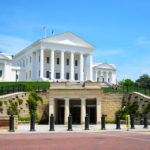 Virginia: The Senate Privileges and Elections Committee advanced several Democratic-backed election measures while rejecting multiple Republican efforts to limit early voting. On an 8-7 vote, the committee passed Senate Bill 57 by Sen. Schuyler VanValkenburg, D-Henrico, which would require Virginia to maintain membership in the Electronic Registration Information Center (ERIC), a multistate data-sharing consortium used to help states maintain accurate voter rolls. But the panel rejected another VanValkenburg proposal, SB 76, on a 9-6 vote. The bill would have consolidated presidential-year primaries by moving all primaries for offices appearing on the November ballot to the presidential primary date, while also adjusting petition signature rules and campaign finance deadlines. The committee advanced SB 58 by Sen. Barbara Favola, D-Arlington, on a 9-5 vote. The bill would extend the deadline for receipt of absentee ballots, ballot cure materials and certain provisional ballot documentation from noon to 5 p.m. on the third day after an election.
Virginia: The Senate Privileges and Elections Committee advanced several Democratic-backed election measures while rejecting multiple Republican efforts to limit early voting. On an 8-7 vote, the committee passed Senate Bill 57 by Sen. Schuyler VanValkenburg, D-Henrico, which would require Virginia to maintain membership in the Electronic Registration Information Center (ERIC), a multistate data-sharing consortium used to help states maintain accurate voter rolls. But the panel rejected another VanValkenburg proposal, SB 76, on a 9-6 vote. The bill would have consolidated presidential-year primaries by moving all primaries for offices appearing on the November ballot to the presidential primary date, while also adjusting petition signature rules and campaign finance deadlines. The committee advanced SB 58 by Sen. Barbara Favola, D-Arlington, on a 9-5 vote. The bill would extend the deadline for receipt of absentee ballots, ballot cure materials and certain provisional ballot documentation from noon to 5 p.m. on the third day after an election.
On mostly party-line votes, the committee rejected several Republican proposals aimed at scaling back early voting. SB 46 by Sen. Christie New Craig, R-Chesapeake, would have reduced in-person absentee voting from 45 days before an election to 15 days. Craig said registrars are struggling with the volume and cost of elections. The committee killed the bill 8-7. A similar proposal, SB 298 by Sen. Mark Peake, R-Lynchburg, would have limited early in-person voting to the 10 days immediately preceding an election, with expanded daily hours. Peake said local governments are being stretched thin. The committee rejected the bill, also by an 8-7 vote. The panel likewise voted down SB 533 by Sen. David Suetterlein, R-Roanoke County, which would have standardized early voting hours statewide.
 Wisconsin: State Democratic lawmakers introduced a package of 25 bills that they say are aimed at protecting voters and elections in Wisconsin. One of the bills would require the Wisconsin Elections Commission to automatically register everyone to vote if they’re eligible. Another bill in the package would shorten the residency requirement for a person to be able to vote at a certain address. Right now, they are required to live there for at least 28 days before the election. The proposed legislation would shorten the requirement to 10 days, which is what state law required before 2011. Democrats are also backing a bill that would ban people from carrying a firearm within 100 feet of a polling place or a location where election officials are conducting a canvass or recount.
Wisconsin: State Democratic lawmakers introduced a package of 25 bills that they say are aimed at protecting voters and elections in Wisconsin. One of the bills would require the Wisconsin Elections Commission to automatically register everyone to vote if they’re eligible. Another bill in the package would shorten the residency requirement for a person to be able to vote at a certain address. Right now, they are required to live there for at least 28 days before the election. The proposed legislation would shorten the requirement to 10 days, which is what state law required before 2011. Democrats are also backing a bill that would ban people from carrying a firearm within 100 feet of a polling place or a location where election officials are conducting a canvass or recount.
Legal Updates This Week
 Alaska: The Alaska Court of Appeals will decide whether to dismiss felony voter misconduct charges against an Alaska resident born in American Samoa, one of numerous cases that has put a spotlight on the complex citizenship status of people born in the U.S. territory. The Alaska Court of Appeals heard arguments last week in the case against Tupe Smith, who was arrested after winning election to a regional school board in 2023. Smith has said she relied on erroneous information from local election officials in the community of Whittier when she identified herself as a U.S. citizen on voter registration forms. Smith’s attorneys have asked the appeals court to reverse a lower court’s decision that let stand the indictment brought against her. Smith’s supporters say she made an innocent mistake that does not merit charges, but the state has argued that Smith falsely and deliberately claimed citizenship. Smith “and others like her who get caught up in Alaska’s confusing election administration system and do not have any intent to mislead or deceive should not face felony voter misconduct charges,” one of her attorneys, Whitney Brown, told the court. The court did not give a timeline for when it would issue a ruling.
Alaska: The Alaska Court of Appeals will decide whether to dismiss felony voter misconduct charges against an Alaska resident born in American Samoa, one of numerous cases that has put a spotlight on the complex citizenship status of people born in the U.S. territory. The Alaska Court of Appeals heard arguments last week in the case against Tupe Smith, who was arrested after winning election to a regional school board in 2023. Smith has said she relied on erroneous information from local election officials in the community of Whittier when she identified herself as a U.S. citizen on voter registration forms. Smith’s attorneys have asked the appeals court to reverse a lower court’s decision that let stand the indictment brought against her. Smith’s supporters say she made an innocent mistake that does not merit charges, but the state has argued that Smith falsely and deliberately claimed citizenship. Smith “and others like her who get caught up in Alaska’s confusing election administration system and do not have any intent to mislead or deceive should not face felony voter misconduct charges,” one of her attorneys, Whitney Brown, told the court. The court did not give a timeline for when it would issue a ruling.
 Arizona: Common Cause and the Arizona Alliance for Retired Americans have filed to intervene in the lawsuit the U.S. Department of Justice has filed against the State of Arizona over voter rolls. The groups argue they have their own unique interests in joining the suit. The groups argue voter information is protected by state privacy laws. They also say the attempt to compile a national voter database stems from unfounded claims that millions of non-citizens are voting, which could lead to people’s registration to be illegally cancelled. The groups argue that the National Voter Registration Act from the ’90s leaves voter administration to the states. Arizona is just one of two-dozen states sued by the DOJ seeking voter rolls.
Arizona: Common Cause and the Arizona Alliance for Retired Americans have filed to intervene in the lawsuit the U.S. Department of Justice has filed against the State of Arizona over voter rolls. The groups argue they have their own unique interests in joining the suit. The groups argue voter information is protected by state privacy laws. They also say the attempt to compile a national voter database stems from unfounded claims that millions of non-citizens are voting, which could lead to people’s registration to be illegally cancelled. The groups argue that the National Voter Registration Act from the ’90s leaves voter administration to the states. Arizona is just one of two-dozen states sued by the DOJ seeking voter rolls.
 California: U.S. District Judge David O. Carter granted a motion to dismiss a Department of Justice lawsuit filed last September demanding California turn over its full voter registration list to the federal government. In his ruling, Carter said he was unpersuaded by the DOJ’s attempts to use provisions of the Help America Vote Act and the Civil Rights Act to force the state to share entire unredacted voter rolls containing the sensitive personal information of millions of residents. Carter said the DOJ’s attempt to use Title III of the Civil Rights Act, which was passed in the Jim Crow era in response to efforts to suppress Black Americans from voting, “lacked depth” and was “contrived.” DOJ argued that its request for the data, including addresses, full names, partial Social Security numbers and driver’s license numbers, was to enforce compliance with the National Voter Registration Act. But Carter wrote in his order that even if Title III had been intended as a mechanism for such enforcement, which it was not, the DOJ did not explain why it would need full, unredacted voter rolls to enforce compliance with the NVRA. Carter also pointed out the “longstanding precedent” for the entitlement of states to redact sensitive data from their voter rolls, including Project Vote/Voting for Am., Inc. v. Long and True the Vote v. Hosemann.
California: U.S. District Judge David O. Carter granted a motion to dismiss a Department of Justice lawsuit filed last September demanding California turn over its full voter registration list to the federal government. In his ruling, Carter said he was unpersuaded by the DOJ’s attempts to use provisions of the Help America Vote Act and the Civil Rights Act to force the state to share entire unredacted voter rolls containing the sensitive personal information of millions of residents. Carter said the DOJ’s attempt to use Title III of the Civil Rights Act, which was passed in the Jim Crow era in response to efforts to suppress Black Americans from voting, “lacked depth” and was “contrived.” DOJ argued that its request for the data, including addresses, full names, partial Social Security numbers and driver’s license numbers, was to enforce compliance with the National Voter Registration Act. But Carter wrote in his order that even if Title III had been intended as a mechanism for such enforcement, which it was not, the DOJ did not explain why it would need full, unredacted voter rolls to enforce compliance with the NVRA. Carter also pointed out the “longstanding precedent” for the entitlement of states to redact sensitive data from their voter rolls, including Project Vote/Voting for Am., Inc. v. Long and True the Vote v. Hosemann.
This week, the state Republican Party filed an emergency application asking the U.S. Supreme Court to issue an injunction to stop the congressional districts California voters approved last year from going into effect. Arguing that the districts created by Proposition 50 violate federal law because the race of voters was considered when they were configured, the filing urges the court to act by Feb. 9 because of ensuing deadlines for candidates to file to run for office. “Our emergency application asks the Supreme Court to put the brakes on Prop. 50 now, before the Democrats try to run out the clock and force candidates and voters to live with unconstitutional congressional districts,” state GOP Chairwoman Corrin Rankin said in a statement. “Californians deserve fair districts and clean elections, not a backroom redraw that picks winners and losers based on race.”
 Michigan: The Michigan Supreme Court has declined – for now – to hear arguments in litigation over absentee ballots cast during the Nov. 4, 2025, mayor’s race in Hamtramck. The court order, issued January 15, instead insists on an expedited decision from the Michigan Court of Appeals. The dispute involves the status of 37 absentee ballots that were found at the city clerk’s office one day after the November election, and remain uncounted. The votes were declared in the meantime as 2,071 votes for Adam Alharbi and 2,060 for Muhith Mahmood. Alharbi’s term as mayor began Jan. 1, and an inauguration event took place Jan. 4. But litigation was still in progress, and a motion for an emergency appeal was filed just before the inauguration. “The Court is not persuaded that the question presented should be reviewed by this Court before consideration by the Court of Appeals. The Court of Appeals shall expedite its consideration of the case,” the state Supreme Court majority ruling said. Justice Elizabeth M. Welch was the one dissenter, saying the Supreme Court does have the discretion to step into a pending case and, given the timing of the circumstances, “I believe that doing so is warranted in this case.” “It is quite possible that Adam Alharbi earned the most votes in the mayoral election. But it is also possible that Muhith Mahmood is the rightful winner,” Welch wrote. “Mayors play an important role in shaping their community’s public policy.”
Michigan: The Michigan Supreme Court has declined – for now – to hear arguments in litigation over absentee ballots cast during the Nov. 4, 2025, mayor’s race in Hamtramck. The court order, issued January 15, instead insists on an expedited decision from the Michigan Court of Appeals. The dispute involves the status of 37 absentee ballots that were found at the city clerk’s office one day after the November election, and remain uncounted. The votes were declared in the meantime as 2,071 votes for Adam Alharbi and 2,060 for Muhith Mahmood. Alharbi’s term as mayor began Jan. 1, and an inauguration event took place Jan. 4. But litigation was still in progress, and a motion for an emergency appeal was filed just before the inauguration. “The Court is not persuaded that the question presented should be reviewed by this Court before consideration by the Court of Appeals. The Court of Appeals shall expedite its consideration of the case,” the state Supreme Court majority ruling said. Justice Elizabeth M. Welch was the one dissenter, saying the Supreme Court does have the discretion to step into a pending case and, given the timing of the circumstances, “I believe that doing so is warranted in this case.” “It is quite possible that Adam Alharbi earned the most votes in the mayoral election. But it is also possible that Muhith Mahmood is the rightful winner,” Welch wrote. “Mayors play an important role in shaping their community’s public policy.”
 South Dakota: The settlement between South Dakota tribes and the state over violations of the National Voter Registration Act has concluded. In 2022, a lawsuit was brought forward by the Rosebud Sioux Tribe, Oglala Sioux Tribe, Lakota People’s Law Project and individual Native voters for failing to provide voter registration opportunities in Native communities. A three-year settlement was approved by the federal district court on Sept. 6, 2022, according to a news release from the Native American Rights Fund. Under the settlement agreement, South Dakota implemented reforms to comply with NVRA rules, mandatory agency training and standardizing procedures for voter registration and address changes. “This case forced meaningful changes that should never have required litigation in the first place,” Rosebud Sioux Tribe President Kathleen Wooden Knife said in the news release. “Native voters deserve equal access to registration every time they interact with state agencies, and we expect those obligations to continue even as this agreement ends.”
South Dakota: The settlement between South Dakota tribes and the state over violations of the National Voter Registration Act has concluded. In 2022, a lawsuit was brought forward by the Rosebud Sioux Tribe, Oglala Sioux Tribe, Lakota People’s Law Project and individual Native voters for failing to provide voter registration opportunities in Native communities. A three-year settlement was approved by the federal district court on Sept. 6, 2022, according to a news release from the Native American Rights Fund. Under the settlement agreement, South Dakota implemented reforms to comply with NVRA rules, mandatory agency training and standardizing procedures for voter registration and address changes. “This case forced meaningful changes that should never have required litigation in the first place,” Rosebud Sioux Tribe President Kathleen Wooden Knife said in the news release. “Native voters deserve equal access to registration every time they interact with state agencies, and we expect those obligations to continue even as this agreement ends.”
 Wyoming: Natrona County Circuit Judge Kevin Taheri rejected an attempt by Weston County clerk to have the criminal case against her dismissed. Defense attorney Ryan Semerad had argued the Wyoming Legislature’s Management Audit Committee acted outside the scope of state law when one of its subcommittees subpoenaed Becky Hadlock. The subcommittee was investigating her actions related to a miscount during the November 2024 general election. Semerad maintains the subpoena was invalid, and he asked Taheri to toss a misdemeanor charge against Hadlock now rather than let the matter proceed to a jury trial. Taheri was unconvinced. After a nearly hour-long hearing this week, the judge concluded the committee possessed the authority to subpoena witnesses as part of its inquiry into Hadlock and the election errors. “I don’t think it is the place of the court to second-guess the Legislature’s motives,” Taheri said. Hadlock faces a single count of failing to appear for a subpoena, which carries a maximum penalty of six months in jail and a $100 fine. Her trial is set for next week, but Semerad told WyoFile after the hearing that he planned to seek a pause in the case while he asks the district court to consider an appeal of Taheri’s decision.
Wyoming: Natrona County Circuit Judge Kevin Taheri rejected an attempt by Weston County clerk to have the criminal case against her dismissed. Defense attorney Ryan Semerad had argued the Wyoming Legislature’s Management Audit Committee acted outside the scope of state law when one of its subcommittees subpoenaed Becky Hadlock. The subcommittee was investigating her actions related to a miscount during the November 2024 general election. Semerad maintains the subpoena was invalid, and he asked Taheri to toss a misdemeanor charge against Hadlock now rather than let the matter proceed to a jury trial. Taheri was unconvinced. After a nearly hour-long hearing this week, the judge concluded the committee possessed the authority to subpoena witnesses as part of its inquiry into Hadlock and the election errors. “I don’t think it is the place of the court to second-guess the Legislature’s motives,” Taheri said. Hadlock faces a single count of failing to appear for a subpoena, which carries a maximum penalty of six months in jail and a $100 fine. Her trial is set for next week, but Semerad told WyoFile after the hearing that he planned to seek a pause in the case while he asks the district court to consider an appeal of Taheri’s decision.
Opinions This Week
National Opinions: Voter data | Voting Rights Act, II | 2026 Midterms, II, III, IV
California: Election night
Colorado: Tina Peters
Florida: Voter fraud | Election legislation
Georgia: Midterm nightmare
Louisiana: Voting Rights Act
Minnesota: Election disruption
Montana: Secretary of state | Election security
New Jersey: Voting rights
North Carolina; State board of elections | Early voting
Ohio: Nonpartisan elections office
Pennsylvania: Free and fair elections
Washington: Ex-felon voting rights
Wisconsin: Disinformation
Upcoming Events
Voting Rights Lab Election Policy Tracker Demo: Voting Rights Lab invites partner organizations, legislative staff, academics, researchers, and members of the media to join us for a demonstration of our Election Policy Tracker on Monday, January 26 at 1 p.m. ET. The Election Policy Tracker is a free, publicly-available tool that tracks election law and proposed legislation across all 50 states and DC. VRL’s Director of Legislative Tracking will walk through our bill search tool, our survey of state election laws, and more during this 30 minute presentation. You can check out our Tracker and create a free account at https://tracker.votingrightslab.org. When: January 26, 1pm Eastern. Where: Online
Help America Vote Day: National Poll Worker Recruitment Day and Help America Vote Day were established by the U.S. Election Assistance Commission (EAC) to inspire civic engagement and encourage people to sign up to become a poll worker. The EAC will recognize January 27, 2026 as Help America Vote Day, and August 11, 2026, as National Poll Worker Recruitment Day. These efforts aim to address the continued need for poll workers to sign up to Help America Vote and strengthen our democracy. When: January 27. Where: Everywhere.
The Law and Politics of Mail-in Voting 2026: Join Moderator Richard Hasen, Director Safeguarding Democracy Project, UCLA School of Law for a discussion with Daniel Thompson, Assistant Professor of Political Science, UCLA and Lynn Vavreck, The Marvin Hoffenberg Professor of American Politics & Public Policy, UCLA for a discussion on mail voting in 2026. When: January 27, 3pm Eastern. Where: Online
2026 NASS Winter Conference: The National Association of Secretaries of State will hold its 2026 Winter Conference in Washington, DC from January 28-31. Please refer to the NASS website for more information about the event and to register. When: January 28-31. Where: Washington, DC.
First Amendment Originalism: In January 1976, the Supreme Court issued its ruling in Buckley v. Valeo, a landmark decision on the extent to which the First Amendment’s free speech clause protects contributions to political campaigns and their expenditures. Fifty years later, the Supreme Court is set to rule in another case on campaign finance and free speech, but the Court’s jurisprudential makeup is considerably different. While a majority of Supreme Court justices identify as originalists, little legal scholarship has been dedicated to understanding the free speech clause according to its original public meaning. Please join AEI for an event cohosted with the Catholic University of America’s Center for the Constitution and the Catholic Intellectual Tradition on the original meaning of the First Amendment’s free speech guarantees. When: January 29. Where: Washington, DC.
2026 NASED Winter Conference: Twice a year, National Association of State Election Directors members gather to discuss the latest developments in election administration. Members of the public are welcome to attend at the non-member registration rate. Please refer to the NASED website for information about the 2026 Winter Conference. When: Feb. 1-3, 2026. Where: Washington, DC.
Oregon Association of County Clerks (OACC) Mid Winter Conference: The Oregon Association of County Clerks hosts two conferences every year. The Mid-Winter Conference is held in Marion County and the Annual Conference is held in the county of the current OACC President. When: February 2-5. Where: Salem.
Massachusetts Town Clerks Association (MTCA) Winter Conference: The Massachusetts Town Clerks Association will hold its Winter Conference at the Devens Commons Center in Devens. When: February 4-6. Where: Devens.
130th Annual County and District Clerks’ Association of Texas (TAC) Conference: The County and District Clerks’ Association of Texas will hold its annual conference in San Marcos. When: February 10-13. Where: San Marcos
EAC Election Audit Standards Hearing: On Wednesday, February 18, join the U.S. Election Assistance Commission (EAC) for a hearing on Election Audit Standards in the agency’s Washington, DC hearing room. During the event, election officials and audit professionals will discuss ways they are effectively using audits to boost public trust in elections. This event will be livestreamed on the EAC’s YouTube channel and held in person. When: February 18, 1:30pm Eastern. Where: Online and Washington, DC.
2026 NACo Legislative Conference: The NACo Legislative Conference brings together nearly 2,000 elected and appointed county officials to focus on federal policy issues that matter most to county governments. Attendees will experience timely, high-impact policy sessions and will interact with executive branch officials, members of Congress and their staff. When: February 21-24. Where: Washington, DC.
Election Center February Workshop: Focusing on interaction and sharing of practices selected by members to receive People’s Choice Awards, the February Workshops formalize those critical conversations that happen at conferences during meals, in the hallways, & the hotel lobby. The agenda augments the award-winning member presentations with applicable research and resources.Two CERA core courses and one renewal will be held following the workshop. When: February 25-27. Where: Jacksonville, Florida.
Election Center April Workshop: In April, the focus is on state associations and state trainings both by modeling conference formats, facilitation techniques, and potential content resources. The Coalition of Election Association Leaders (CEAL) guides state groups in their maturation process with mentorship and networking opportunities. When: April 22-24. Where: Chicago.
Job Postings
electionlineWeekly publishes election administration job postings each week as a free service to our readers. To have your job listed in the newsletter, please send a copy of the job description, including a web link to mmoretti@electionline.org. Job postings must be received by 5pm on Wednesday in order to appear in the Thursday newsletter. Listings will run for three weeks or till the deadline listed in the posting.
Administrative Specialist III (Elections Specialist Lead), King County Elections– The Department of Elections is searching for an energetic and resourceful professional who likes to get stuff done. The Administrative Specialist III in the Elections Department combines an exciting environment with the opportunity to cultivate talents and apply a variety of skills. The ideal candidate will thrive in an innovative, fast-paced environment and will not hesitate to roll up both sleeves, work hard, have fun, and get the job done. This position will lead processes, projects, and people within the Opening work area of Ballot Processing. This will include leading, coaching, mentoring, and training temporary and regular staff. Leads may also provide assistance and/or participate in long-term cross-training in multiple work areas to meet organizational agile efforts. This is a great opportunity for a person with strong communication and interpersonal skills. Salary: $32.44 – $41.25 Hourly. Deadline: January 26. Application: For the complete job listing and to apply, click here.
Communications Fellow: The Communications Fellow will report to the Communications Specialist and work in collaboration with the Communications and Content Teams to amplify CEIR’s work supporting elections and election officials. These outreach efforts include writing blog posts and social media content, assisting with editing CEIR videos, creating new CEIR graphics, generating ideas for new content products, and monitoring news for stories relevant to CEIR’s work. The Communications Fellow will also provide logistical support for CEIR webinars and media briefings. The Communications Fellow may have the opportunity to propose one or more projects in support of CEIR’s efforts to reach new audiences in the lead-up to the 2026 midterm elections. This Fellowship is a full-time, term-limited position planned to last 12 months (anticipated March 2026 through February 2027). This Fellowship is an entry-level role, and all interested candidates with a relevant college degree or equivalent work experience are encouraged to apply. Salary: $55,000. Deadline: January 30. Application: For the complete job listing and to apply, click here.
Director of Election Information Technology, King County, Washington– King County Elections (KCE) seeks a dynamic and visionary leader to serve as our Director of Elections Information Technology (Division Director – Technology). The Director of Elections Information Technology will report to the elected Director of Elections, serve as a member of the Department’s Leadership Team, and lead and support a highly skilled team to achieve excellence in election technology, security, and administration. This role will play a key part in developing departmental goals, strategies, and initiatives, driving the adoption of new technologies within KCE, and fostering a culture of innovation and collaboration. This is a unique opportunity to inspire and empower a team, drive the adoption of new technologies within KCE, identify opportunities to bring innovation to the forefront of our operations, and significantly impact the future of election administration in one of the most populous and diverse counties in the United States. This is a hybrid position that performs work remotely and on-site. As a leadership team member, this position is expected to work on-site frequently during active elections. Salary: $166,509 – $211,060. Application: For the complete job listing and to apply, click here.
Election Operations & Workforce Manager, Charleston County, South Carolina– The Board of Voter Registration and Elections is an award-winning organization dedicated to excellence in electoral processes. Our mission is to daily serve the Charleston County voting constituency with Vigilance, Objectivity, and Transparency in a manner that promotes due diligence Excellence in all aspects of Elections Management. We are committed to continuous improvement, innovative practices, and exceptional service to our community, ensuring every voter’s voice is heard. Are you driven by a passion for democracy and civic engagement? Join the Board of Voter Registration and Elections as the Election Operations and Workforce Manager and play a critical role in delivering seamless, fair, and accessible elections. Key Responsibilities: Poll Worker Recruitment and Management; Polling Location Management; Liaison and Community Engagement; Support for Election Operations on Election Day and Early Voting; and Team Leadership. Salary: $68,140 – $89,252. Application: For the complete job listing and to apply, click here.
Election Software Specialist, Printelect– Printelect is a dynamic and well-established regional election technology & services company with a proven track record in ballot printing, mail services, and a diverse portfolio of election products. With over fifty employees and one hundred twenty years of industry-leading experience, we take pride in our commitment to excellence and customer satisfaction. We partner with local governments throughout Virginia, North Carolina, South Carolina, and Georgia to provide products, services, and support for the conduct and administration of Federal, State, and local elections. Job Duties and Responsibilities: Work with our county and city official customers to translate their jurisdictional requirements and candidate data into formats used by voting equipment software. Utilize proprietary election management software, Microsoft Office, and Adobe Suite to build jurisdiction-specific databases, format paper and electronic ballots, and configure voting equipment to utilize those datasets. Provide phone and on-site support for our customers and troubleshoot any issues that arise. Communicate and cross-train with internal departments to facilitate accurate election preparation and good customer service. Develop a comprehensive understanding of all manufacturer hardware and software manuals, and be able to effectively communicate that information to team members and customers. Stay up to date on all new software updates and hardware offerings. Participate in on-site customer training and election day support. Salary: $55,000-60,000. Application: For the complete job listing and to apply, click here.
Elections Project Manager, Riverside County, California– The County of Riverside’s Registrar of Voter is seeking a qualified Elections Project Manager to join their Administrative Team in Riverside. The Elections Project Manager is a management level position reporting to the Assistant Registrar of Voters, with no direct supervisory responsibility. The position is responsible for managing all Registrar of Voters process improvement initiatives and major operational projects. This role applies comprehensive knowledge of elections functions, programs, and services to ensure projects align with County goals and strategic priorities, while identifying, analyzing, and resolving issues encountered during project development and implementation. The position provides high level project, analytical, and budget period support to five managers including Fiscal, Voter Services, Operations, Outreach, and the Public Information Officer. Key responsibilities include coordinating staff, contractors, County departments, and external agencies; managing contracts related to voting technology, election equipment, and services; collaborating with Purchasing to ensure timely acquisition and delivery; supporting operational needs to conduct elections; performing major project analysis under agreement and contract requirements; developing and presenting reports for County and community submission; and delivering presentations and analysis during the budget process. The ideal candidate for the Elections Project Manager position will possess a strong combination of technical expertise, leadership, and interpersonal skills, with experience managing projects within an elections office or a comparable public-sector elections environment. The most competitive candidates will have proficiency in project management methodologies, ideally with PMI certification, and a proven track record of successfully managing complex projects from initiation to completion. They will demonstrate strong presentation skills and the ability to analyze data to inform decision-making and reporting. Exceptional written and verbal communication skills are essential for collaborating with diverse stakeholders, including staff, contractors, County departments, and community members. The role requires the ability to work independently, manage competing deadlines, and maintain flexibility in scheduling to meet operational and project demands. Bilingual in Spanish is highly desired but not required. At this time, the position has the opportunity for a hybrid telework schedule based on business need, however job expectations, at times may require in person interaction. Telework may change at any time and you will be expected to report to the office. The incumbent will be required to work in the office full time during elections due to the volume of work. Salary: $97,289.00 – $138,984.00 Annually. Deadline: February 9. Application: For the complete job listing and to apply, click here.
Outreach Administrator/Senior Outreach Administration, Arapahoe County, Colorado – The Election Outreach Administrator performs specialized level administrative, and professional work in carrying out a comprehensive public facing service operation. This position specifically leads and supports all areas of community outreach including voter education materials, judge training, coordinating various voter programs and partnering with designated election officials and the partner community at large. Salary: $54,589.08 – $81,831.10. Deadline: January 26. Application: For the complete job listing and to apply, click here.
Regional Sales Director – Pacific West, Runbeck–The Regional Sales Director is responsible for leading high-value sales efforts, managing key client relationships, and driving revenue growth through strategic account development. This role requires a seasoned sales professional with a proven record of exceeding sales targets, developing new business opportunities, and nurturing long-term client partnerships. The Regional Sales Director acts as a trusted advisor to clients, aligning solutions with their business objectives while contributing to the company’s overall sales strategy and success. Territory will cover California, Nevada, Oregon, Washington, Alaska and Hawaii. Application: For the complete job listing and to apply, click here.
Training Program Manager, Charleston County, South Carolina– Democracy works best when every election runs flawlessly—and that starts with exceptional training. As Training Manager for the Board of Voter Registration and Elections, you’ll empower our poll managers and staff to deliver elections that are fair, accessible, and trusted by every voter in Charleston County. The Board of Voter Registration and Elections is an award-winning organization dedicated to excellence in electoral processes. Our mission is to daily serve the Charleston County voting constituency with Vigilance, Objectivity, and Transparency in a manner that promotes due diligence Excellence in all aspects of Elections Management. We believe that people are the foundation of successful elections. That’s why training is not just a task—it’s a core function of our mission. When our teams are prepared, voters can be confident that their voice will be heard, and their ballot counted. As Training Manager, you are not simply teaching procedures—you are building trust in the democratic process. You will design and deliver training that helps every poll manager, staff member, and Board member understand the importance of their role, perform it with confidence, and meet the highest standards of service to our voters. Salary: $68,140.00 – $82,000.00 Annually. Application: For the complete job listing and to apply, click here.
Voter Services Manager, Arapahoe County, Colorado– The Voter Service Manager performs managerial level administrative, supervisory, and professional work in carrying out a comprehensive public facing service operation. This position specifically supervises the Voter Services team, which includes voter registration maintenance, GIS/Address Library, public information reporting and the election phone bank. Salary: $77,439.18 – $123,701.24. Deadline: February 4. Application: For the complete job listing and to apply, click here.
Marketplace
electionline provides no guarantees as to the quality of the items being sold and the accuracy of the information provided about the sale items in the Marketplace. Ads are provided directly by sellers and are not verified by electionline. If you have an ad for Marketplace, please email it to: mmoretti@electionline.org